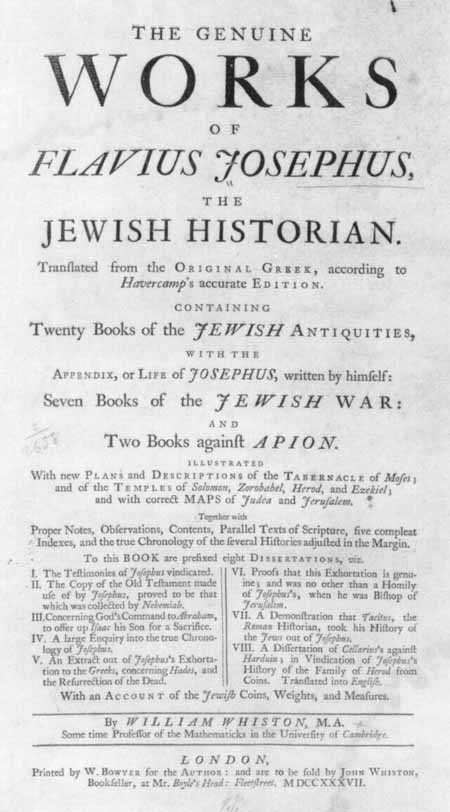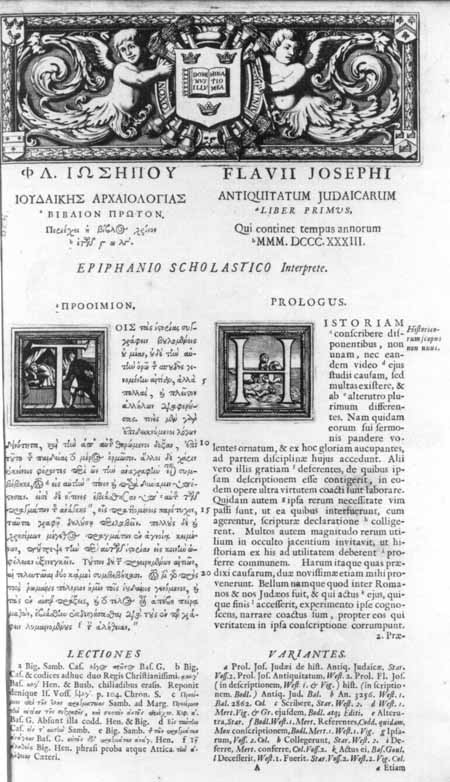First Judaica & Judaic Firsts: Works of Josephus
It is most appropriate that among the more elegant volumes in the Jefferson collection is a splendid edition of The Genuine Works of Flavius Josephus, the Jewish Historian. Of folio size, it contains: "Twenty Books of the Jewish Antiquities, with Appendix, or Life of Josephus, written by himself: Seven Books of the Jewish War: and Two Books against Apion." The publisher is pleased to boast that it is "Illustrated with new Plans and Descriptions of the Tabernacle of Moses; and of the Temples of Solomon, Zorababel, Herod and Ezekiel; and with correct Maps of Judea and Jerusalem." The translation into English "from the original Greek, according to Havercamp's accurate Edition," is by William Whiston, M.A., "Sometime Professor of Mathematics in the University of Cambridge." Whiston was both a mathematician and a Christian divine, a friend of Sir Isaac Newton and his successor to the professorship of mathematics. This edition is the first printing of Whiston's justly famed and widely popular translation, published in London in 1737 by W Bowyer "for the author."
 |
The volume was published for the translator, not the author, for the author Josephus lived more than sixteen centuries earlier in the Holy Land. Born in the year 38 CE of a noble family of priestly descent, he boasts, "By my mother I am of royal blood ... from the children of Asmoneus." He received both a religious and classical education and was apparently gifted in diplomacy, being at age twenty-six entrusted with a mission to Rome to secure the release of a group of priests who had been imprisoned and sent to Rome by the procurator Felix-a mission Josephus successfully accomplished.
 |
In the year 66 CE, at the outbreak of the Jewish rebellion against Rome, Josephus was appointed military commander of Galilee. Although he was among those who sought accommodation with the imperial power, he nevertheless fought against the Roman legions. Defeated, he betrayed colleagues who had chosen group suicide over enslavement and surrendered to the enemy. His life spared, he became a pensioner of the Roman emperor, who had him brought to Rome. There in 75 CE, at age thirty-eight, he wrote The Jewish War, which he claims, "was the greatest of all [wars], not only that have been in our times, but, in a manner of those that ever were heard of, both of those wherein cities have fought against cities, or nations against nations." Eighteen years later, he wrote the Antiquities of the Jews, "to explain who the Jews originally were; what fortunes they had been subject to; and by what legislator they had been instructed in piety and the exercise of other virtues; what wars they also had made in remote ages, till they were unwillingly engaged in this last, with the Romans." Both works were classic creations, informative and absorbing. Editions of Josephus began to appear in the early years of printing, translations multiplied, and, second only to the Bible, it was the most popular work in Colonial and early republic America.
Sources: Abraham J. Karp, From the Ends of the Earth: Judaic Treasures of the Library of Congress, (DC: Library of Congress, 1991).


